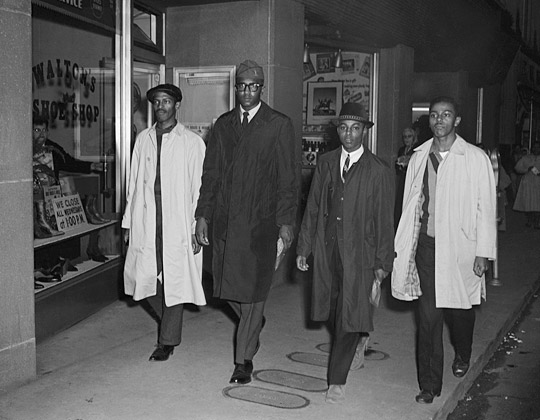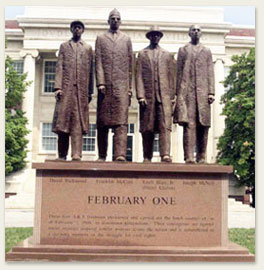Greensboro Four: David Richmond, Franklin McCain, Ezell Blair Jr. (Jibreel Khazan), Joe McNeil
Civil Rights Sit-Ins at Woolworth
by Jaime Huaman, Government & Heritage Library, 2010
See also: Greensboro Sit-Ins
 On February 1, 1960, David Richmond, Franklin McCain, Ezell Blair Jr. (Jibreel Khazan), and Joe McNeil, four African American students from North Carolina A&T State University, staged a sit-in in Greensboro at Woolworth, a popular retail store that was known for refusing to serve African Americans at its lunch counter. Not long after their protest, sit-ins began occurring across the South, including the North Carolina cities of Charlotte, Durham, and Winston-Salem. These young men came to be known as the Greensboro Four.
On February 1, 1960, David Richmond, Franklin McCain, Ezell Blair Jr. (Jibreel Khazan), and Joe McNeil, four African American students from North Carolina A&T State University, staged a sit-in in Greensboro at Woolworth, a popular retail store that was known for refusing to serve African Americans at its lunch counter. Not long after their protest, sit-ins began occurring across the South, including the North Carolina cities of Charlotte, Durham, and Winston-Salem. These young men came to be known as the Greensboro Four.
In 1954, the United States Supreme Court ruled in Brown v. Board of Education of Topeka that state laws establishing separate public schools for black and white students denied black children equal educational opportunities were unconstitutional. Six years later, the segregation was still present in public places throughout the South. The four seventeen year olds determined that they would enter the store, purchase some school supplies, and then sit down at the lunch counter to eat. They would argue that if the store would take their money for school supplies then they should serve them at the lunch counter.
When the students sat down at the "white only" counter of Woolworths they were told they would not be served. The police were called, but the Greensboro Four stayed until the store closed that day. The following day, twelve African Americans sat at the counter, and the protest grew. By February 7th the city was filled with thousands of demonstrators for and against segregation. Bomb threats were received. Counter-protestors opposing racial integration flung insults and water balloons at those demonstrating against segregation. The Greensboro Four remained calm could be seen sitting at a table in the Woolworth dining area reading Goethe and textbooks. As a result, physical violence did not become a part of the protest.
 On July 26, five and a half months after the sit-in began local businesses agreed to serve African Americans alongside their white patrons. The Greensboro Four lead the way for desegregation in North Carolina.
On July 26, five and a half months after the sit-in began local businesses agreed to serve African Americans alongside their white patrons. The Greensboro Four lead the way for desegregation in North Carolina.
As a tribute, a monument of the Greenboro Four has been erected at North Carolina A&T State University. The Woolworth store closed in 1993 and is now home to the International Civil Rights Center & Museum. A section of the Woolworth's lunch counter with four stools is on view in Washington, D.C. at the National Museum of American History.
References and additional resources:
Brown, Nikki L. M., and Barry M. Stentiford. 2008. The Jim Crow encyclopedia. Westport, Conn: Greenwood Press.
Channing, Steve. 2004. February One: The Story of the Greensboro Four. PBS: Independent Lens series.
Covington, Howard E., and Marion A. Ellis. 2002. The North Carolina century: Tar Heels who made a difference, 1900-2000. Charlotte, N.C.: Levine Museum of the New South.
13 September 2010 | Huaman, Jaime